Modi Govt's Job Creation Record: Economist Bhalla
By Bijay Kumar Singh, New Delhi May 05, 2024 11:20
Economist Surjit Bhalla claims India created 10 million jobs under Modi, exceeding past periods. He attributes jobless growth to the UPA era and highlights FDI policy concerns.

Illustration: Dominic Xavier/Rediff.com
New Delhi, May 5 (PTI) Former India's executive director at IMF Surjit Bhalla on Sunday said that on an average basis, an unprecedented number of jobs are being created under the Narendra Modi government, with the number touching about 10 million over the last 7-8 years.
Bhalla further said the least number of jobs were created during 2004-2013 (UPA government period), and it was then that the term 'jobless growth' came about.
"The job creation by the Modi government has been the highest on record.
"Never before in Indian history have so many jobs been created on an average basis. Something close to 10 million jobs over the last 7-8 years," he told PTI in a video interview.
Bhalla, a former member of the Economic Advisory Council to the Prime Minister (EAC-PM), asserted that the maximum number of jobs were created during the tenure of Atal Bihari Vajpayee and Modi.
He was responding to a recent International Labour Organization (ILO) report, which showed that in 2022, the share of unemployed youths in India's total unemployed population was nearly 83 per cent.
"If you look at the data of youth after the age of 29, the unemployment rate in India, which is the most of the population, most of the workforce has been somewhere around 1 per cent, which is really not much of an unemployment rate at all," Bhalla explained.
For the youth, he said they are looking for a better job.
"So, frictional unemployment is higher everywhere in the world, amongst the youth," Bhalla noted.
Prime Minister Modi-led BJP government came to power in 2014 and came back with a thumping majority in the 2019 general elections.
On slowing down of foreign direct investment in India, Bhalla said an important reason for the fall in FDI in India could be attributed to the government's new policy, which says if there is a dispute related to investment, then it has to be settled in India.
"Now, if I am a foreign investor, why should I take that risk? And I don't think it is the case anywhere else in the world," he said.
According to Bhalla, foreigners are not increasing their direct investment, but they are raising their portfolio investment.
"I am hoping that whichever the new government will be, I believe it will be the BJP, that this is one policy they have to take a second look at," he said.
Last year, gross FDI inflows slowed marginally to USD 59.9 billion in April-January 2023-24 from USD 61.7 a year ago, while net FDI inflows fell sharply to USD 14.2 billion from USD 25 billion.
FDI flows to China have fallen dramatically from a share of 12.5 per cent in the first nine months of 2022 to only 1.7 per cent in the same period of 2023.
Various countries like the US, Canada, Mexico, Brazil, Poland and Germany have witnessed significant gains in the global share following the decline of FDI flows to China.
Bhalla predicted that the ruling Bharatiya Janata Party (BJP) is likely to get between 330-350 seats on its own on the basis of statistical possibility.
"So, if the BJP gains about five percentage points increase in its vote share in this Lok Sabha polls, then I think the party is likely to get 330 to 350 seats," he said.
The seven-phase Lok Sabha polls, the world's biggest election exercise, kicked off on April 19, with the counting of votes set to take place on June 4.
Bhalla further said the least number of jobs were created during 2004-2013 (UPA government period), and it was then that the term 'jobless growth' came about.
"The job creation by the Modi government has been the highest on record.
"Never before in Indian history have so many jobs been created on an average basis. Something close to 10 million jobs over the last 7-8 years," he told PTI in a video interview.
Bhalla, a former member of the Economic Advisory Council to the Prime Minister (EAC-PM), asserted that the maximum number of jobs were created during the tenure of Atal Bihari Vajpayee and Modi.
He was responding to a recent International Labour Organization (ILO) report, which showed that in 2022, the share of unemployed youths in India's total unemployed population was nearly 83 per cent.
"If you look at the data of youth after the age of 29, the unemployment rate in India, which is the most of the population, most of the workforce has been somewhere around 1 per cent, which is really not much of an unemployment rate at all," Bhalla explained.
For the youth, he said they are looking for a better job.
"So, frictional unemployment is higher everywhere in the world, amongst the youth," Bhalla noted.
Prime Minister Modi-led BJP government came to power in 2014 and came back with a thumping majority in the 2019 general elections.
On slowing down of foreign direct investment in India, Bhalla said an important reason for the fall in FDI in India could be attributed to the government's new policy, which says if there is a dispute related to investment, then it has to be settled in India.
"Now, if I am a foreign investor, why should I take that risk? And I don't think it is the case anywhere else in the world," he said.
According to Bhalla, foreigners are not increasing their direct investment, but they are raising their portfolio investment.
"I am hoping that whichever the new government will be, I believe it will be the BJP, that this is one policy they have to take a second look at," he said.
Last year, gross FDI inflows slowed marginally to USD 59.9 billion in April-January 2023-24 from USD 61.7 a year ago, while net FDI inflows fell sharply to USD 14.2 billion from USD 25 billion.
FDI flows to China have fallen dramatically from a share of 12.5 per cent in the first nine months of 2022 to only 1.7 per cent in the same period of 2023.
Various countries like the US, Canada, Mexico, Brazil, Poland and Germany have witnessed significant gains in the global share following the decline of FDI flows to China.
Bhalla predicted that the ruling Bharatiya Janata Party (BJP) is likely to get between 330-350 seats on its own on the basis of statistical possibility.
"So, if the BJP gains about five percentage points increase in its vote share in this Lok Sabha polls, then I think the party is likely to get 330 to 350 seats," he said.
The seven-phase Lok Sabha polls, the world's biggest election exercise, kicked off on April 19, with the counting of votes set to take place on June 4.
Source: PTI
Read More On:
DISCLAIMER - This article is from a syndicated feed. The original source is responsible for accuracy, views & content ownership. Views expressed may not reflect those of rediff.com India Limited.
You May Like To Read
TODAY'S MOST TRADED COMPANIES
- Company Name
- Price
- Volume
- GTL Infrastructure
- 2.93 ( -4.87)
- 226206286
- IFL Enterprises
- 1.30 (+ 4.84)
- 81461564
- Vodafone Idea L
- 16.79 (+ 0.66)
- 67447398
- NCL Research
- 0.95 ( -4.04)
- 31996628
- Franklin Industries
- 3.73 (+ 3.32)
- 21511209
MORE NEWS

Navi Mumbai Airport ILS Signal Testing Begins
The Airports Authority of India (AAI) has begun ILS signal testing at the...

Air India VRS for Non-Flying Staff Ahead of...
Air India has announced a voluntary retirement scheme (VRS) and voluntary separation...
Fisher Groups Oppose WTO Fisheries Subsidy Talks
Small-scale fisher groups from India, Indonesia, and Bangladesh demand WTO keep...



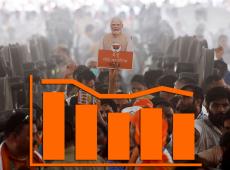
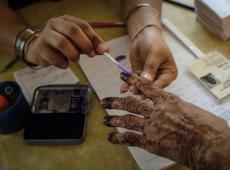

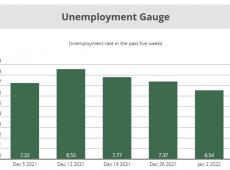
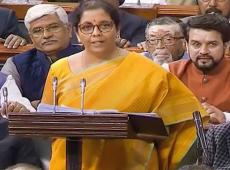

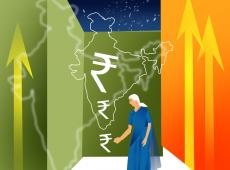
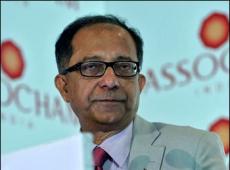
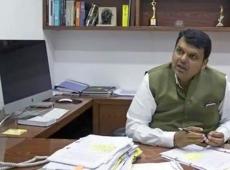
 © 2024 Rediff.com India Limited. All rights reserved.
© 2024 Rediff.com India Limited. All rights reserved.